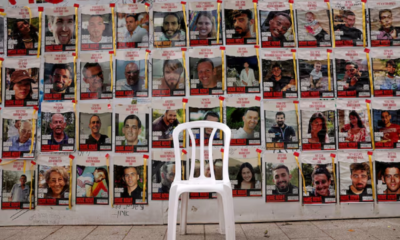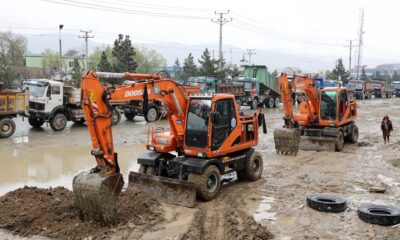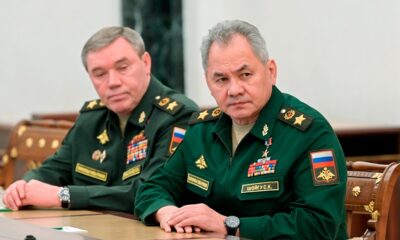World
Belarus starts taking delivery of Russian nuclear weapons
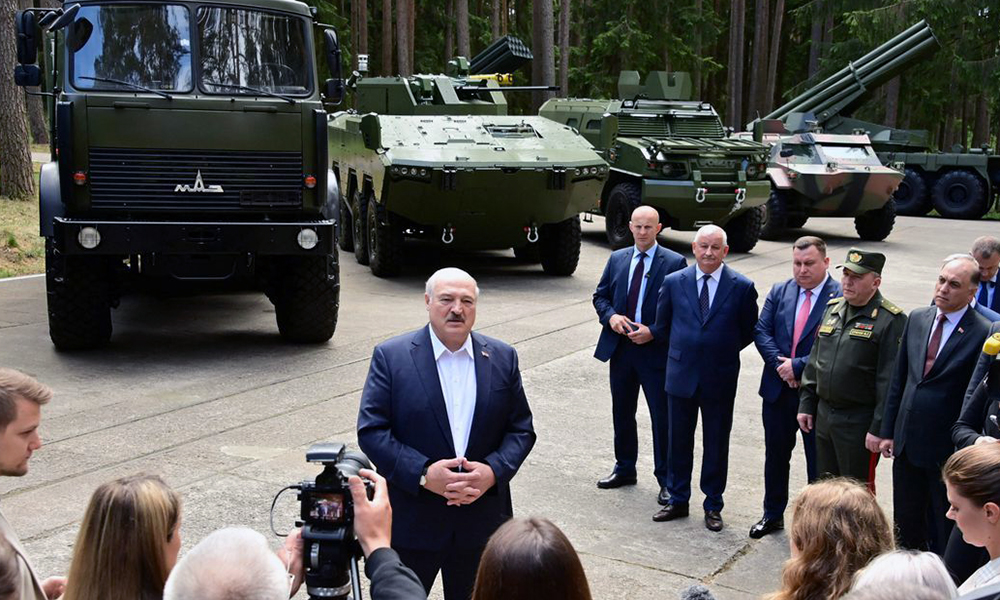
Belarusian President Alexander Lukashenko has said his country has started taking delivery of Russian tactical nuclear weapons, some of which he said were three times more powerful than the atomic bombs the US dropped on Hiroshima and Nagasaki in 1945, Reuters reported.
The deployment is Moscow’s first move of such warheads – shorter-range less powerful nuclear weapons that could potentially be used on the battlefield – outside Russia since the fall of the Soviet Union.
“We have missiles and bombs that we have received from Russia,” Lukashenko said in an interview with the Rossiya-1 Russian state TV channel which was posted on the Belarusian Belta state news agency’s Telegram channel.
“The bombs are three times more powerful than those (dropped on) Hiroshima and Nagasaki,” he said, speaking on a road in a forest clearing with military vehicles parked nearby and some kind of military storage facility visible in the background.
Russian President Vladimir Putin said on Friday that Russia, which will retain control of the tactical nuclear weapons, would start deploying them in Belarus after special storage facilities to house them were made ready, read the report.
The Russian leader announced in March he had agreed to deploy tactical nuclear weapons in Belarus, pointing to the U.S deployment of such weapons in a host of European countries over many decades.
The United States has criticised Putin’s decision but has said it has no intention of altering its own stance on strategic nuclear weapons and has not seen any signs that Russia is preparing to use a nuclear weapon.
The Russian step is nonetheless being watched closely by the United States and its allies as well as by China, which has repeatedly cautioned against the use of nuclear weapons in the war in Ukraine.
Lukashenko, a close ally of Putin, told Russian state TV in the interview, which was released late on Tuesday, that his country had numerous nuclear storage facilities left over from the Soviet-era and had restored five or six of them, Reuters reported.
He played down the idea that Russian control of the weapons was an impediment to using them quickly if he felt such a move was necessary, saying he and Putin could pick up the phone to each other “at any moment”.
Earlier on Tuesday, he had said separately that the Russian tactical nuclear weapons would be physically deployed on the territory of Belarus “in several days” and that he had the facilities to host longer-range missiles too if ever needed.
Lukashenko, who has allowed his country to be used by Russian forces attacking Ukraine as part of what Moscow calls its “special military operation”, says the nuclear deployment will act as a deterrent against potential aggressors.
Belarus borders three NATO member countries: Lithuania, Latvia and Poland, red the report.
The 68-year-old former Soviet collective farm boss, who has ruled Belarus since 1994, making him Europe’s longest-serving leader, said he didn’t simply ask Putin for the weapons, but “demanded” them.
“We have always been a target,” Lukashenko said. “They (the West) have wanted to tear us to pieces since 2020. No one has so far fought against a nuclear country, a country that has nuclear weapons.”
Lukashenko has repeatedly accused the West of trying to topple him after mass protests against his rule erupted in 2020 in the wake of a presidential election the opposition said he had fraudulently won. Lukashenko said he had won fairly, while conducting a sweeping crackdown on his opponents.
World
Hamas says it received Israel’s response to its ceasefire proposal
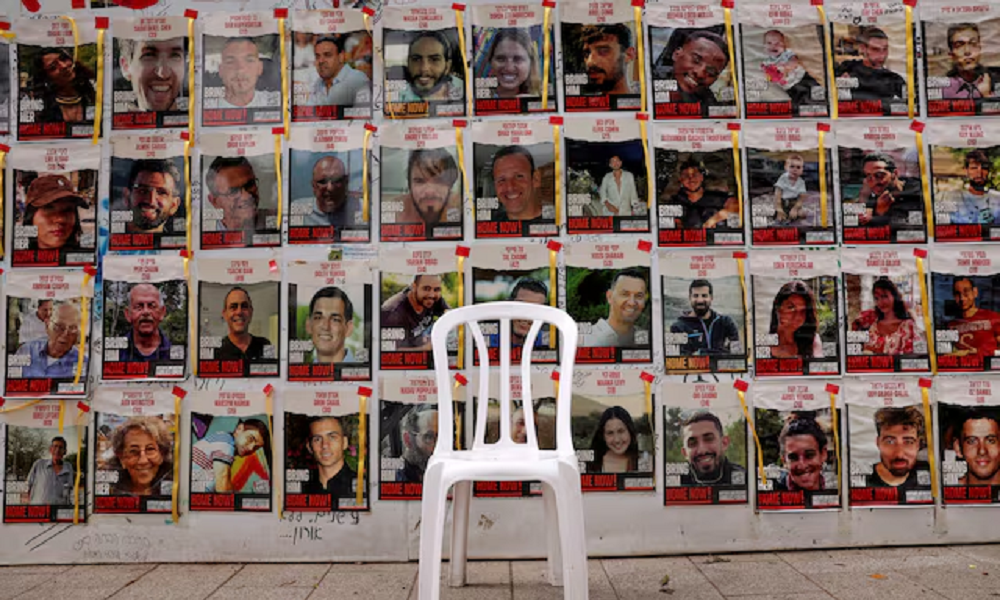
Hamas said it had received on Saturday Israel’s official response to its latest ceasefire proposal and will study it before submitting its reply, the group’s deputy Gaza chief said in a statement.
“Hamas has received today the official response of the Zionist occupation to the proposal presented to the Egyptian and the Qatari mediators on April 13,” Khalil Al-Hayya, who is currently based in Qatar, said in a statement published by the group.
After more than six months of war with Israel in Gaza, the negotiations remain deadlocked, with Hamas sticking to its demands that any agreement must end the war.
An Egyptian delegation visited Israel for discussion with Israeli officials on Friday, looking for a way to restart talks to end the conflict and return remaining hostages taken when Hamas fighters stormed into Israeli towns on Oct. 7, an official briefed on the meetings said.
The official, who spoke on condition of anonymity, said Israel had no new proposals to make, although it was willing to consider a limited truce in which 33 hostages would be released by Hamas, instead of the 40 previously under discussion.
On Thursday, the United States and 17 other countries appealed to Hamas to release all of its hostages as a pathway to end the crisis.
Hamas has vowed not to relent to international pressure but in a statement it issued on Friday it said it was “open to any ideas or proposals that take into account the needs and rights of our people”.
However, it stuck to its key demands that Israel has rejected, and criticised the joint statement issued by the U.S and others for not calling for a permanent ceasefire and the withdrawal of Israeli forces from Gaza.
White House national security adviser Jake Sullivan said on Friday he saw fresh momentum in talks to end the war and return the remaining hostages.
Citing two Israeli officials, Axios reported that Israel told the Egyptian mediators on Friday that it was ready to give hostage negotiations “one last chance” to reach a deal with Hamas before moving forward with an invasion of Rafah, the last refuge for around a million Palestinians who fled Israeli forces further north in Gaza earlier in the war.
Meanwhile, in Rafah, Palestinian health officials said an Israeli air strike on a house killed at least five people and wounded others.
Hamas fighters stormed into Israeli towns on Oct. 7, killing 1,200 people and capturing 253 hostages. Israel has sworn to annihilate Hamas in an onslaught that has killed more than 34,000 Palestinians.
World
In Beijing, Blinken meets Xi and raises US concerns about China’s support for Russia

U.S. Secretary of State Antony Blinken raised concerns on Friday about China’s support for Russia’s military, one of the many issues threatening to sour the recent improvement in relations between the world’s biggest economies.
Blinken raised the matter during five-and-a-half hours of talks with China’s top diplomat Wang Yi in Beijing, the latest high-level contact between the countries that have reduced the acrimony that pushed ties to historic lows last year.
The U.S. diplomat is due to wrap up his visit on Friday with little progress on a raft of contentious issues including U.S. complaints about cheap Chinese exports. Instead, both sides are focusing on pragmatic issues like people-to-people exchanges.
“The Secretary discussed concerns about PRC support to the Russian defense industrial base,” U.S. State Department spokesperson Matthew Miller said, adding the two sides also discussed Taiwan, the South China Sea and other flashpoints.
The PRC is short for China’s official name, the People’s Republic of China.
Despite its “no limits” partnership with Moscow, China has steered clear of providing arms for Russia’s war in Ukraine.
But U.S. officials warn its companies are helping the weapons industry with an unprecedented build up that has helped to turn the tide of the war. For example, bigger machine tool imports from China have helped Russia increase its ballistic missile production, they say.
The U.S. officials say such assistance risks hurting the broader bilateral relationship, even as ties stabilise after being hit by then-House Speaker Nancy Pelosi’s visit to Taiwan in 2022 and the U.S. downing of a suspected Chinese surveillance balloon in February 2023.
China has said it has not provided weaponry to any party, adding that it is “not a producer of or party involved in the Ukraine crisis”. However, it says that normal trade between China and Russia should not be interrupted or restricted.
STEADYING THE SHIP
In addition to his talks with Wang, Blinken met Chinese President Xi Jinping, who reiterated Beijing’s concerns that the United States was suppressing its economic development.
“This is a fundamental issue that must be addressed, just like the first button of a shirt that must be put right, in order for the China-U.S. relationship to truly stabilise, improve and move forward,” Xi said.
Earlier, Wang told Blinken that the “giant ship” of the China-U.S. ties had stabilised, “but negative factors in the relationship are still increasing and building.”
Wang also said the U.S. had taken “endless” measures to suppress China’s economy, trade, science and technology, equating such steps to containment.
“And the relationship is facing all kinds of disruptions. China’s legitimate development rights have been unreasonably suppressed and our core interests are facing challenges,” Wang told Blinken.
The agenda for the talks had been set during the November summit between Biden and Xi in San Francisco and a follow-up call in April.
Underscoring the growing discord between the two sides, hours before Blinken landed in China on Wednesday, U.S. President Joe Biden signed a bipartisan bill that included $8 billion to counter China’s military might, as well as billions in defence aid for Taiwan and $61 billion for Ukraine.
Wang said the U.S. must not step on “red lines” covering sovereignty, security and development interests – an apparent reference to Taiwan, the democratically governed island that China claims as its own, and the disputed South China Sea.
Other issues on the table include artificial intelligence and the U.S. push for progress on the curbing of China’s supply of the chemicals used to make fentanyl.
Blinken, along with senior U.S. officials focused on anti-narcotics collaboration with China, met China’s minister of public security, Wang Xiaohong, to discuss the fentanyl issue.
Ahead of Friday’s talks, U.S. Treasury Secretary Janet Yellen signalled that Biden was not taking any options off the table to respond to China’s excess industrial capacity.
Wang said that the U.S. should stop “hyping up” the “false narrative” of China’s overcapacity.
(Reuters)
World
US student protests over Gaza intensify despite arrests
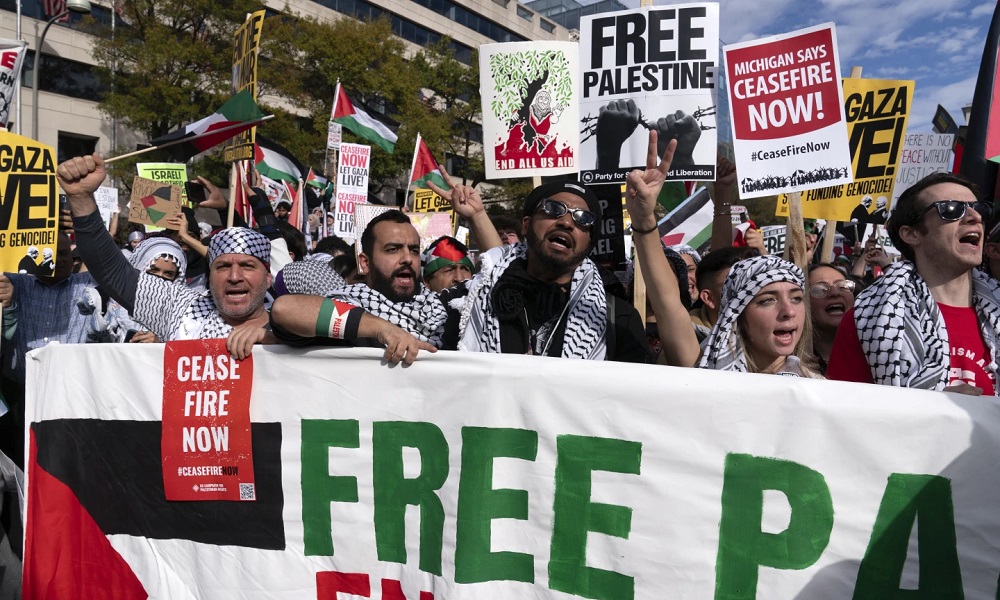
Students at a growing number of U.S. colleges continue to gather in pro-Palestinian encampments with a unified demand that Israel end its war on Gaza and that universities to divest from companies with ties to Israel.
So far, police have arrested hundreds of student protesters at numerous colleges, including the University of Southern California, University of Texas at Austin, and Columbia University in New York, among others.
The growing unrest on college campuses is also accompanied by a rise in antisemitism.
CNN reports that antisemitic acts have surged across America and particularly on campuses since October 7.
Islamophobia has also run rampant.
The recent surge in protests have in turn inflamed tensions, forcing leadership to decide when free speech on campus crosses a line and becomes threatening, CNN reports.
Several colleges have called the police on protesters, leading to the arrests of hundreds across multiple campuses.
On Wednesday, at the University of Texas at Austin, state troopers in riot gear, including some on horseback, began breaking up a group of protesters shortly after a demonstration.
The arrests on Wednesday in cities of Austin and Los Angeles came as students at Harvard University and Brown University on the east coast also defied threats of action and set up encampments in solidarity with Palestinians in Gaza.
Al Jazeera reported that protesters at Columbia University, the epicenter of demonstrations that began last week, said they won’t disperse until the school agrees to cut ties with Israeli universities and commits to divesting funds from Israel-linked entities, among other demands.
Tensions on multiple US campuses were sparked after Hamas’ October 7 attack, where militants killed about 1,200 people and took over 200 hostages. Israel retaliated on Gaza and has over the past six months killed more than 34,000 people.
When did the current conflict start?
CNN reports that the situation escalated last week at Columbia University when the university’s president, Nemat “Minouche” Shafik, testified before a House committee about the school’s response to charges of campus antisemitism. A pro-Palestinian protest kicked off on campus at the same time.
Following her testimony, Shafik requested in a letter released by the university that the New York City Police Department remove people who were encamped on the South Lawn of the campus who were “in violation of the University’s rules and policies” and trespassing.
More than 100 people were arrested.
The encampments were organized by Columbia University Apartheid Divest (CUAD), a student-led coalition of more than 100 organizations, to protest what they describe as the university’s “continued financial investment in corporations that profit from Israeli apartheid, genocide, and military occupation of Palestine.”
Since last Thursday, other college campuses have faced similar protests and encampments, as well as arrests.
Pro-Palestinian encampments have been set up at the Massachusetts Institute of Technology, Emerson College, the University of Texas at Austin, the University of Michigan and the University of California, Berkeley. On Wednesday, police arrested nearly 100 protesters at the University of Southern California after a dispersal order.
Yale University police arrested at least 45 protesters Monday while Harvard University closed Harvard Yard and officials at the school suspended a pro-Palestinian student organization for allegedly violating school policies, CNN reported.
-

 Latest News4 days ago
Latest News4 days agoRashid Khan named AWCC’s brand ambassador
-

 World4 days ago
World4 days agoMalaysian navy helicopters collide in mid-air, 10 killed
-

 Sport4 days ago
Sport4 days agoJaiswal ton powers Rajasthan to big IPL win
-

 World4 days ago
World4 days agoNorth Korea officials visit Iran in a rare public trip
-

 Latest News5 days ago
Latest News5 days agoAt least 1,500 families affected by recent floods: IRW
-

 Sport4 days ago
Sport4 days agoMawj Sahil player scores stunning halfway line goal in 1-0 win over Jawanan Wahedi
-

 Sport3 days ago
Sport3 days ago‘Serious talent’ Fraser-McGurk bonds with Warner to light up IPL
-

 Latest News4 days ago
Latest News4 days agoUS report cites ‘significant deterioration’ in Afghan women’s rights last year




